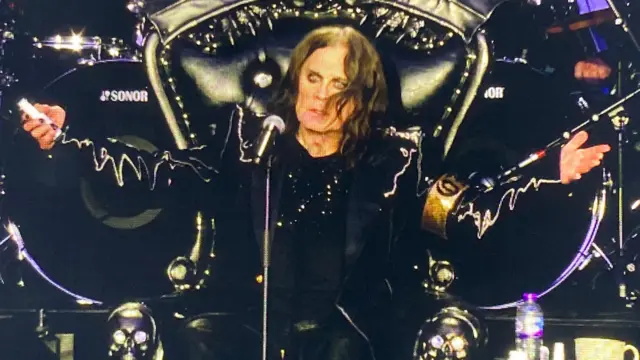Black Sabbath’s Final Resurrection: One Last Night of Heavy Metal Glory in Birmingham
Villa Park erupted on July 5, 2025, when the announcement broke: Black Sabbath were back, one last time, in their hometown of Birmingham. After years of distance, the original lineup—Ozzy Osbourne, Tony Iommi, Geezer Butler, and Bill Ward—were about to reunite for a farewell that promised both spectacle and soul.

Ozzy Osbourne, 76, appeared onstage atop his iconic bat-themed throne, clad in signature black. The crowd’s chant of his name washed over him—he grinned back, health challenges and all, proving his voice still commanded power even seated.
Tony Iommi stepped up next, guitar in hand. The man who forged Sabbath’s doom-laden sound after an industrial accident was right where he belonged. His riffs still dripped with that heavy, foreboding tone that founded heavy metal.
Geezer Butler took his place behind the bass, grounding the sound with his thunderous rhythms. His deep grooves have been the heartbeat of Sabbath since the late ’60s. Together with Iommi, the twin pillars of their sound reignited with conviction.
The moment Bill Ward climbed behind the drums was electric. His surprise return—his first concert with Sabbath in 20 years—restored the band’s original heartbeat. Each snare and cymbal crack resonated with decades of shared history.
The band launched into “War Pigs,” and the opening riff struck like a hammer. Villa Park’s air was thick with nostalgia, fury, and unity. Generations of fans swayed and screamed together, transporting Sabbath’s message across the ages.
Next came “Iron Man,” and Ozzy’s “I am Iron Man” reverberated across thousands of voices. The signature tritone riff and echoing vocals tore through the night, momentarily erasing the divide between the band’s early days and this final, epic chapter.
They poured their souls into “N.I.B.,” Geezer’s bass baseline roaring like a beast unleashed. Ozzy’s voice, though physically diminished, told the story with heartfelt reverence. The performance held theatrical weight, like a closing act in a rock opera.
Finally came “Paranoid,” a fitting anthem to close their set. As fireworks illuminated the sky, Ozzy shouted, “I fucking love you!” The crowd exploded. There were no encores, only a reverent hush as the final chord faded and the weight of the moment sunk in.
Earlier, the event had been a legendary line‑up of all‑star acts. Metallica, Slayer, Pantera, Alice in Chains and more paid tribute in force, underscoring Sabbath’s global influence and making the night feel like a festival of generations.
Even the ticket chaos and steep pint prices couldn’t dampen spirits. Fans flooded in from across the UK and beyond, aware they were witnessing a cultural milestone. The shared love of the band outweighed any minor frustrations.
Between songs, cameras cut to the band’s “Freemen of the City” reception—just days before, they had been honored with Birmingham’s highest civic accolade. That unity of music, place, and legacy painted the night with historic brush strokes.
The stage production echoed their scope—Jason Momoa’s hosting, Tom Morello’s musical direction, rotating platforms, pyrotechnics. It felt less like a concert and more like the closing ceremony of heavy metal’s grandest story.
Ozzy’s solo set had earlier broken hearts and inspired cheers. But this reunion felt deeper—four friends reconnecting, celebrating decades of riffs, setbacks, and triumphs. It was cathartic and personal, staged with grandeur and humility.
The livestream brought the show to millions worldwide, raising funds for Parkinson’s research, children’s hospitals, and hospice care. The night felt sacred—and not just for entertainment, but for cause and community, motherhood of their beginnings.
As the final chords of “Paranoid” died away and the band left the stage, the hush in the stadium was profound. They had returned to where it all began and left on their own terms—ensuring their legacy would forever echo through the streets of Birmingham.
In every sense, Sabbath’s last act was not a surrender—it was a crescendo, a celebration that reminded the world why their music mattered, and why in Birmingham that night, metal felt eternal.





